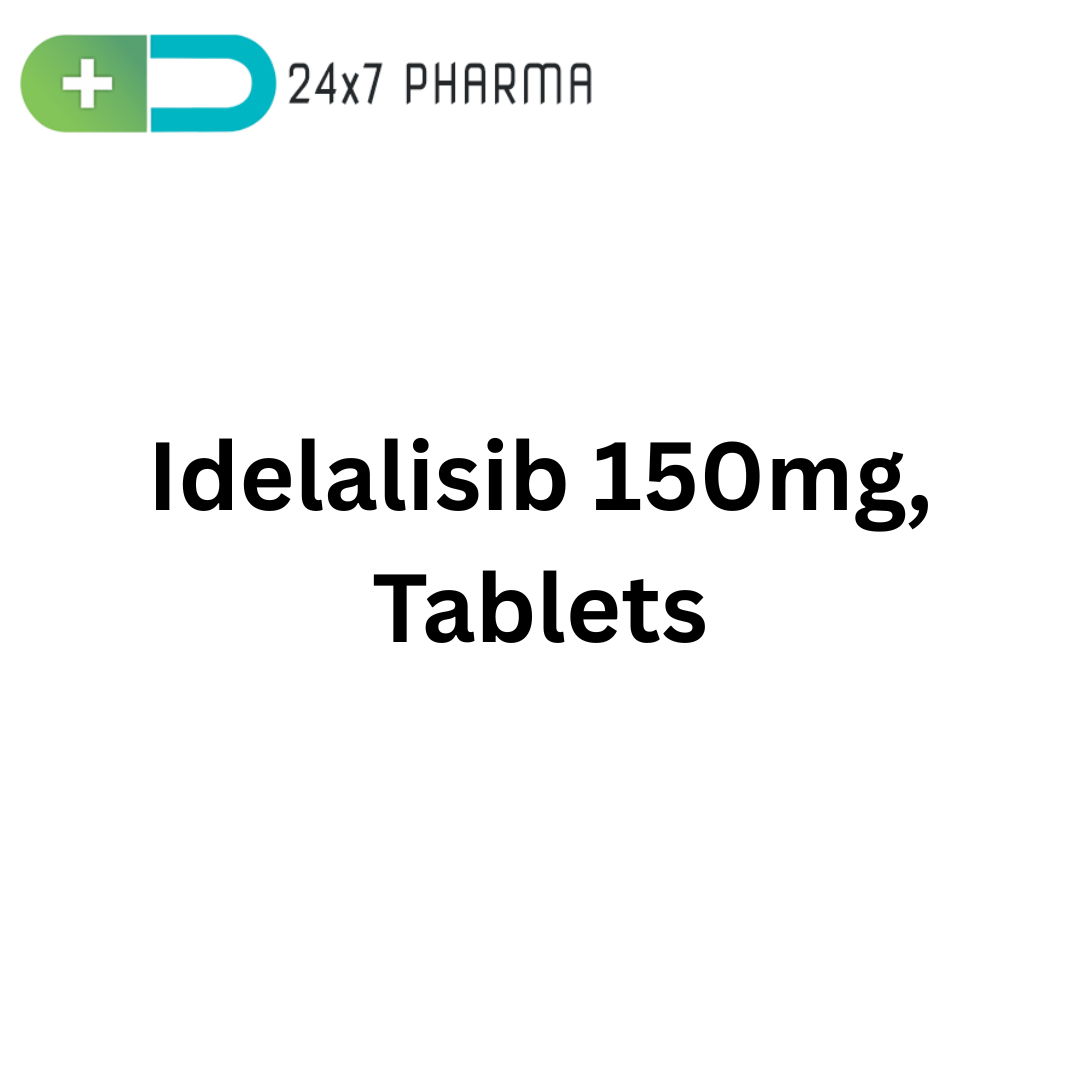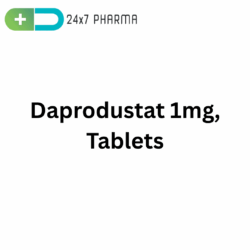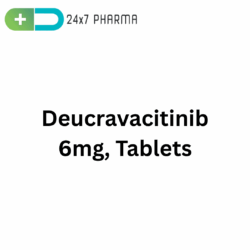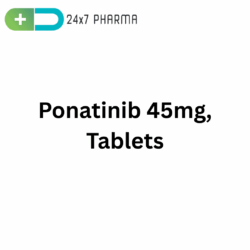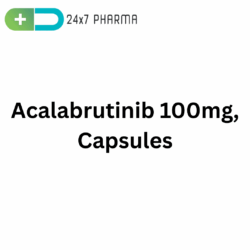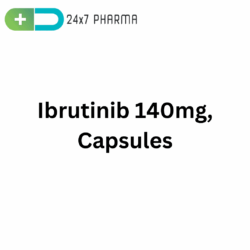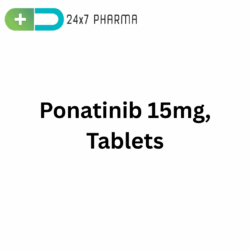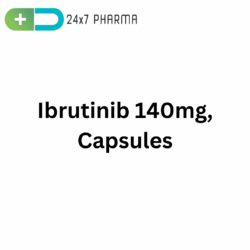LuciDela 150mg, Idelalisib Tablets
LuciDela 150mg is a prescription medication containing Idelalisib, a potent oral drug used primarily in the treatment of certain blood cancers. This targeted therapy belongs to a class of drugs known as PI3K delta inhibitors and is particularly effective in treating chronic lymphocytic leukemia (CLL), follicular B-cell non-Hodgkin lymphoma (FL), and small lymphocytic lymphoma (SLL). Manufactured under strict pharmaceutical standards, LuciDela helps slow or stop the growth of malignant cells by interfering with key survival pathways in cancer cells.
What is LuciDela 150mg (Idelalisib)?
Idelalisib, an anti-cancer drug found in LuciDela 150mg, targets particular signaling pathways in malignant white blood cells. It is used when the disease has relapsed or in patients who cannot tolerate other standard treatments. It’s often prescribed in combination with other drugs such as rituximab to enhance therapeutic outcomes in patients with blood malignancies.
How it Works / Mechanism of Action
Idelalisib is a selective phosphoinositide 3-kinase delta (PI3Kδ) inhibitor. PI3Kδ is an enzyme frequently overactive in certain B-cell malignancies, contributing to abnormal growth and survival of these cells. By blocking PI3Kδ, Idelalisib interrupts signals essential for:
- Cancer cell survival
- Proliferation
- Migration
- Adhesion
Malignant B cells undergo apoptosis, or programmed cell death, as a result of this suppression, which also lowers the tumor burden. The targeted nature of Idelalisib allows for cancer-specific activity with less toxicity to normal cells.
How to Use / Indications
The following conditions are approved for treatment with LuciDela 150mg:
- Relapsed Chronic Lymphocytic Leukemia (CLL) – typically in combination with rituximab.
- Relapsed Follicular B-cell Non-Hodgkin Lymphoma (FL) – for patients who have received at least two prior systemic therapies.
- Small Lymphocytic Lymphoma (SLL) – when other treatments fail.
- It is used under the supervision of a hematologist or oncologist experienced in cancer chemotherapy.
How to Take / Dosage
- The typical adult dosage is one 150 mg tablet taken orally twice a day, separated by around 12 hours.
- With or without food, LuciDela should be eaten whole with water.
- It is not recommended to chew or crush tablets.
- Do not take another dose if you experience nausea after taking one; instead, wait until the next scheduled dose.
Other Dosage and Adjustments
- Dose Reduction: In cases of severe toxicity (e.g., diarrhea, liver enzyme elevation), the dosage may be reduced to 100 mg twice daily or discontinued if necessary.
- Renal Impairment: No adjustment generally needed for mild to moderate impairment.
- Hepatic Impairment: Use with caution in moderate/severe impairment; baseline liver function monitoring is essential.
- Dosage may vary when used with other medications (especially CYP3A inhibitors or inducers).
Side Effects
LuciDela (Idelalisib) may cause both common and serious side effects. Regular monitoring is important during treatment.
Common Side Effects
- Diarrhea
- Fatigue
- Nausea
- Cough
- Abdominal pain
- Rash
- Fever
- Decreased appetite
Serious Side Effects
- Severe diarrhea or colitis – May require dose reduction or discontinuation
- Liver toxicity – Elevated liver enzymes (ALT, AST); routine liver tests are essential
- Pneumonitis – Inflammation of the lungs causing cough, shortness of breath
- Serious infections – Pneumonia, CMV reactivation, sepsis; requires prompt treatment
- Severe skin reactions – Including Stevens-Johnson Syndrome (rare but serious)
- Neutropenia – Low white blood cells, increasing infection risk
Routine lab tests are advised to monitor liver enzymes, white blood cells, and infection markers throughout treatment.
Storage
- Store at room temperature (15°C to 30°C).
- Keep in original packaging to protect from moisture and light.
- Keep out of reach of children.
- Do not use after the expiry date printed on the label.
Benefits
LuciDela 150mg offers significant benefits for patients with limited treatment options:
- Targeted therapy with minimal effects on non-cancerous cells.
- Convenient oral dosing, avoiding hospital-based IV infusions.
- Improved progression-free survival in relapsed CLL and FL.
- Used as part of combination therapy for enhanced efficacy.
- Provides options for patients intolerant to chemotherapy.
Prescription
LuciDela 150mg is a prescription-only medicine and should be used under the supervision of a qualified oncologist. Its use should follow a complete clinical evaluation including diagnosis, disease stage, and treatment history.
Drug Interactions
LuciDela (Idelalisib) may interact with several drugs:
- CYP3A Inhibitors (e.g., ketoconazole) – May increase Idelalisib levels, increasing toxicity risk.
- CYP3A Inducers (e.g., rifampin) – May decrease efficacy by lowering Idelalisib levels.
- Immunosuppressants – May compound the risk of opportunistic infections.
- Antiviral drugs – Monitoring needed due to potential CMV reactivation.
- Vaccines – Live vaccines should be avoided during therapy due to immunosuppression.
- Close monitoring and dose adjustments may be necessary to avoid adverse interactions.
FAQs
How long will I need to take LuciDela?
As long as it remains effective and well-tolerated. Treatment duration varies.
How long should I take LuciDela?
Continue as prescribed until it stops working or causes serious side effects.
Does LuciDela increase infection risk?
Yes, it can lower immunity and increase the risk of serious infections.
Conclusion
LuciDela 150mg (Idelalisib) is a significant advancement in the targeted treatment of relapsed or refractory blood cancers such as CLL, FL, and SLL. Its mechanism focuses on blocking key survival pathways in malignant B cells, offering hope to patients with limited alternatives. While it offers convenience and efficacy, its use must be carefully managed due to potential side effects, including liver toxicity and infections. Regular monitoring, appropriate patient selection, and close medical supervision ensure optimal outcomes with LuciDela. For an accurate diagnosis, the start of therapy, and follow-up, always seek the advice of a licensed oncologist.

